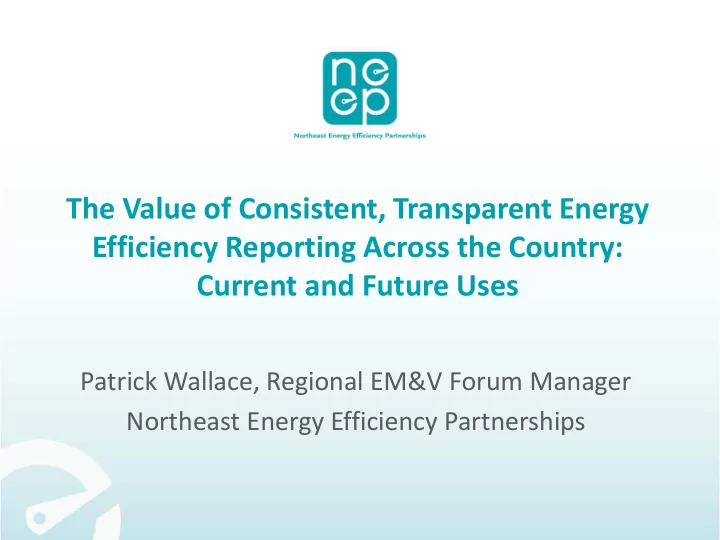

The Value of Consistent, Transparent Energy Efficiency Reporting Across the Country: Current and Future Uses Patrick Wallace, Regional EM&V Forum Manager Northeast Energy Efficiency Partnerships
About NEEP Mission Accelerate energy efficiency as an essential part of demand-side solutions that enable a sustainable regional energy system Approach Overcome market barriers and transform markets via: Collaboration, Education and Enterprise Vision Region embraces next generation energy efficiency as a core strategy to meet energy needs in a carbon-constrained world One of six regional energy efficiency organizations (REEOs) funded by the US Department of Energy (US DOE) to link regions to US DOE guidance, products and programs 1
Regional EM&V Forum Goal: Build a Transparent and Common EM&V Platform (per NECPUC/MACRUC Resolutions) PAs PUCs DEPs SEOs ISO/RTOs RGGI EE Data Consistent Sharing Consistent Common Savings EM&V Methods EE Reporting Inputs 2
Regional Energy Efficiency Platform • Expenditures Reported • Savings EE Data • Peak to Energy Ratio • Avoided Emissions Research and Analysis into • Program Plans Supporting Topics of • Annual Reports Interest and Documents • TRMs Publications on Findings. • EE Forecast Info • Program & Study Form EM&V • SEE Action Guidelines Methods • Assessment of Rigor • User Guide 3
REED Overview Visit REED at www.reed.neep.org 4
REED Overview Types of Data included in Common Reporting Guidelines and REED: • Annual and Lifetime Energy Savings • Summer and Winter Peak Demand Savings • Peak to Energy Ratios • Avoided Air Emissions* • Savings as a Percent of Sales • Program Expenditures • Job Creation Impacts • Cost of Saved Energy* • Program Funding Sources * REED internal calculations, using methodology supported by Forum participants 5
REED Overview 6
REED Overview How Energy Efficiency Stakeholders Can Use REED Data Aggregate results to inform regional Compare program impacts to and national impacts / policies help identify best practices Incorporate EE data Support system & transmission into air quality plans planning, forecasting 7
How NEEP Uses REED Energy Efficiency Policy Snapshot The full Energy Efficiency Policy Snapshot can be found here. 8
How NEEP Uses REED Regional Roundup of Energy Efficiency Policy The full Regional Roundup report can be found here. 9
REED Uses Consistency in EE reporting at regional level can support good planning 10
Regional Energy Efficiency Platform • Expenditures Reported • Savings EE Data • Peak to Energy Ratio • Avoided Emissions Research and Analysis into • Program Plans Supporting Topics of • Annual Reports Interest and Documents • TRMs Publications on Findings. • EE Forecast Info • Program & Study Form EM&V • SEE Action Guidelines Methods • Assessment of Rigor • User Guide 11
Standardized EM&V Methods Reporting A Project of the Regional EM&V Forum 2010 2011-12 2013-14 Forum develops Some (but not many) Forum shifts focus to Regional EM&V states cite the EM&V transparency - Methods Guidelines Methods Guidelines standardized forms (14 measures) developed and Steering Comm. adopts July 2014 Overarching Goal: Build transparency and understanding of EM&V practices to support inclusion of EE resources in state, regional and national energy & environmental policies and markets 12
Standardized EM&V Methods Reporting The ‘Food Label’ for Various Audiences PUCs, DEPs, EPA, SEOs, system planners, PAs, evaluation consultants want to know: • What EM&V methods were used to estimate reported savings? • How rigorous are the reported EE savings? • How do EM&V methods compare across states? • How do EM&V methods used align with existing state, regional or national EM&V protocols? • Where should I focus my attention in review of specific studies and program EM&V? • How can I streamline my evaluation review process and reduce administrative costs? 13 13
Standardized EM&V Methods Reporting The Forms – Digital Platform – Version 1.0 http://www.neep.org/initiatives/emv-forum/model-emv- methods-standardized-reporting-forms 14
Standardized EM&V Methods Reporting Study Form Program Form 15
Standardized EM&V Methods Reporting Form Categories Program Form Study Form 1 – General Information 1 – Program Year Summary 2 – Study Summary and Results 2 – Program EM&V Methods Summary 3 – EM&V Methods for Gross Savings 3 – Program EM&V Rigor 4 – EM&V Methods for Net Savings Summary 5 – Study EM&V Rigor Summary 4 – Relevant EM&V Documents/Protocols 6 – Relevant EM&V Docs/Protocols 7 – Recommendations 16
Standardized EM&V Methods Reporting Program Form - Methods Baseline Gross savings Verification Persistence Net-to-gross Measure life 17
Standardized EM&V Methods Reporting EM&V Rigor EM&V Strategy Data Quality Sampling Methods Confidence/Precision Measurement Methods 18
Standardized EM&V Methods Reporting References Standard Industry Protocols US DOE UMP Protocols 19
Standardized EM&V Methods Reporting Mix of Standardized and ‘Open - Ended’ Questions structured response flexible response 20
Standardized EM&V Methods Reporting State Pilots & Next Steps • Tested several programs and underlying studies • Worked with PAs and their contractors • Regulatory staff feedback and suggestions on changes to forms • Generally very helpful input and experience • Final report on the pilot and webinar with recommendations due out end of September • Develop plan for a searchable database to store completed forms 21
Standardized EM&V Methods Reporting Alignment with CCP EM&V Requirements • EM&V Method Reporting Forms closely align with EPA’s proposed EM&V reporting requirements (some modifications needed) • Potential for incorporation of forms into a national EE registry (e.g. The Climate Registry) • Version 2.0 of Forms to be released early 2016 EM&V EM&V Plan Report 22
QUESTIONS? Patrick Wallace Regional EM&V Forum Manager pwallace@neep.org P: 781.860.9177. ext. 138 Northeast Energy Efficiency Partnerships (NEEP) 91 Hartwell Avenue Lexington, MA 02421 www.neep.org
Recommend
More recommend